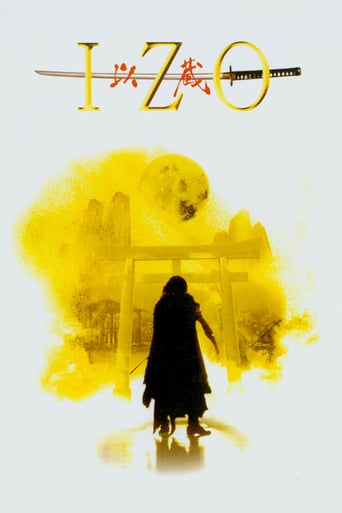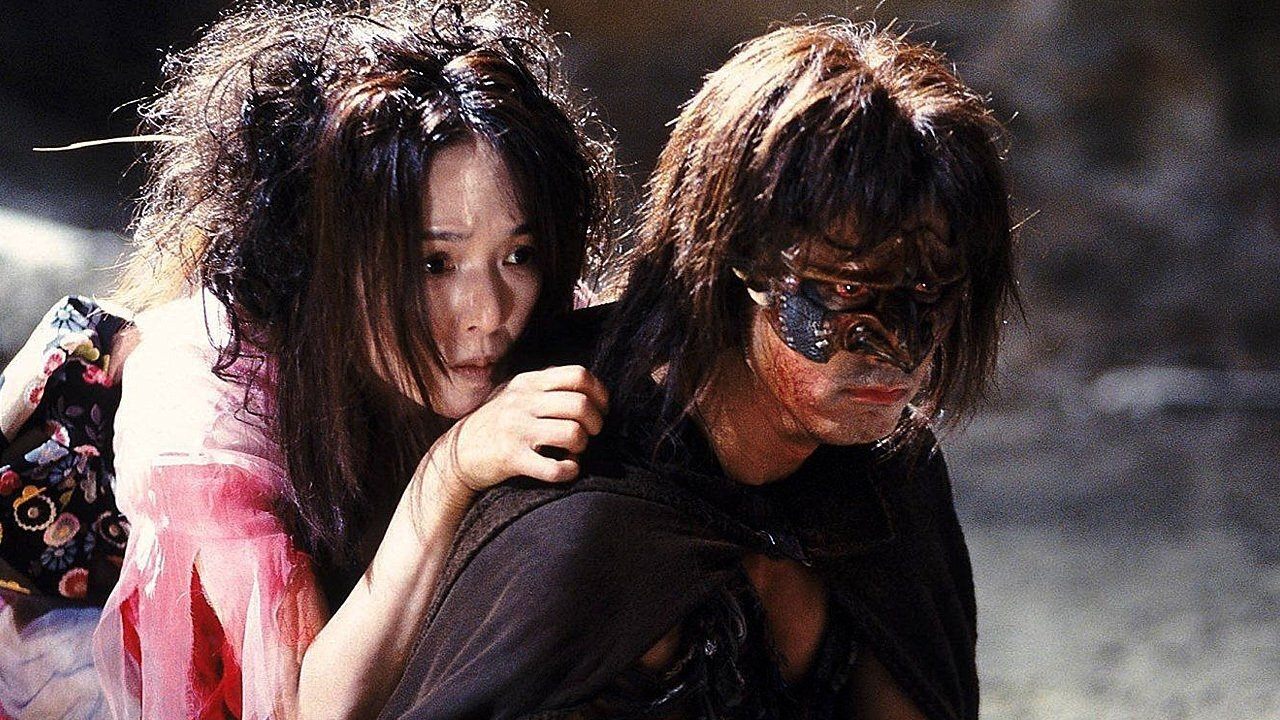jzappa
Miike has slowly amassed international recognition for his shockingly extreme violence and absurd sexual perversions. Many of his films contain explicit and lurid bloodshed, often in an outlandish, ridiculous way. This particular action fantasy of his seems to have proved less accessible to anyone other than art-house audiences and fans of extreme cinema. I have yet to understand why. This bizarre massacre is full of symbolisms and simultaneously provokes both metaphysical complexities and suspension of disbelief. But so it goes with Miike.There is a vast world of difference between a self-indulgent affectation of symbolism or intellectual pretension and a film by Takashi Miike in which he decides to offer some substance. There should not be some sort of barrier between the film and its audience. There is a remarkably unique atmosphere to this film, a dark, drug-like visual fusion of grunge and everything foreign to the viewer. We begin when the Shogunate is on its last legs, but still capable of punishing its enemies. The one we see is Izo, an assassin in the service of a warlord. After killing countless Shogun men, Izo is crucified and repeatedly speared. Instead of being passing on into an afterlife or ceasing to exist, his rage propels him through the space-time continuum, which races by through stock footage of World War II, to present-day Tokyo, where he finds himself on the streets and one with the city's destitute, a little like Bram Stoker's Dracula in that this violent warrior's vengeful soul transcends mortality to oppose it forever.Here Izo kills everyone in sight, no matter where time and space spontaneously and indefinitely throw him, his spirit still full of rage from his treatment in his past life, seemingly slicing and dicing timelessly till he can finally reach the karmic powers-that-be, one allegorical character played by the great minimalist actor-director Beat Takeshi, whose predecessors put him to death.Miike's depiction of the title character, or more exactly his phantom life force, exceeds reality, time and space as a surrealist rendering of Izo's extraordinarily and endlessly gory yet philosophical confrontations in a literal infinity drenched by symbolic imagery and characterizations, and accompanied by the fascinating, hilarious, disturbing acid-folk singer Kazuki Tomokawa on guitar.He is not stuffing these elements and images with profundity. He is actually telling the story as directly as one could. By symbolic imagery, I do not mean Bergmanesque questions of identity and metaphors that lie too deep for words or many other forms of reaction. I mean we actually at a couple of points see Izo running laps around a computer-generated infinity symbol. Different instances like the scene in which flowers gossip about and laugh at him, a woman pulling a sword from her vagina, Izo fully clad in samurai apparel and spattered with blood walking through an incidental modern office of cubicles. These are all very direct illustrations of surrealism, basic features of the element of surprise and startling juxtapositions.Really, in spite of this supernatural bloodbath's abstract implications, it is an explosion of rage and psychosis, endlessly violent, with a body count significantly higher than the Kill Bill films or even other gorefests by Miike himself. It is massive entertainment in the sense that a violent video game is, relieving your tensions by reflecting every ounce of aggression you may feel. My experience seeing it was refreshingly rich.
Witchfinder General 666
Generally speaking, I am a fan of director Takashi Miike. His masterpiece "Audition" of 1999 is one of the very few brilliant Horror films from the 90s, and his repertoire includes quite a bunch of other great films. That being said, my feelings on "Izo" of 2004 are mixed. Miike is not exactly known for his conventional style of film-making, and "Izo" is indeed a film of unspeakable weirdness (which I like). The film, which is, as usual for Miike's films, very gory (even though actually not even quite as brutal as I expected it to be), basically consists of a vast number of gory battle sequences. These scenes of carnage are strung together with intervals of philosophical questions concerning life, politics and sociology. The film, which is more than imaginatively made with impressive and surreal settings, a perfect photography and astonishing effects, is brilliant in some aspects, and it has some moments that are downright ingenious. That being said, it sadly gets incredibly monotonous after a while and, as far as I am concerned, it is at least 30 minutes too long. In spite of its weirdness, "Izo" therefore regrettably evokes mainly one feeling: That of boredom.In 1865, the assassin Izo (Kazuya Nakayama), who stands in the service of Hanpeida, an Imperial supporter, is captured after having killed many of the Shogun's men. After being executed in a particularly cruel manner, Izo does not vanish, but his rage makes him return as a vengeful (semi-)ghost, traveling through the ages in order to get his revenge...As mentioned above, the film is very good in several aspects. It is immensely stylishly made, the carnage sequences are exceptional, the often surreal settings are more than impressive. In short: all the stylistic elements are superb, and I also liked the philosophical approaches. The performances are also good, Kazuya Nakayama is weird enough as Izo, and the supporting cast includes the great Takeshi Kitano. Inbetween, however, the film becomes overlong, sometimes almost insufferably boring, making it hard to sit through. Like everything by Miike, the film is a matter of personal taste; unlike many of his other films, this one didn't meet mine. Worth checking out for hardcore Miike-enthusiasts, but boring to sit through for everyone else.
The Enigmatic Ronin
Only Takashi Miike could make a film like that. This movie is very symbolic, and bizarre. Izo is story about an evil spirit, who once was an assassin, who travel trough time and realms, to avenge his death. Miike have expressed his feelings in a very unnatural way. The question is what is "Izo"?, there are many answers to the question, my personal opinion is that, Izo is the Japanese part of the second world war, and japan in war situation trough the history, and the cruelty of the human nature, he is the dark side of every person. Miike show you clues pretty clear in the movie. When he kills his first victim he ask him, are you so brutal because you are human or human because you are brutal?(cruelty of the human nature). He shows also how religion can be misused, in personal interest and how hypocritical it can be. In the scene where he kills his own mother is also an symbolic example, his mother says "killing me is like killing yourself Izo", when a population corrupts and destroy there country they destroy there own system...they destroy themselves. The whole thing start to make sense if we relate it to the second world war. In the beginning Izo looks like an ordinary person ,cool, but later on he becomes more fierce, he even kills children and innocent people, civilian people are those who suffer the most in a war. With other words the war from the Japanese side didn't look like bad thing, but later on they saw the cruelty of the war. In the end Izo do look like a monster, with a mask, evolution... changes of war how it changes in a negative way, mask is an accessory, just like the army used armored weapon in later wars.Izo is brilliant movie, I'm not saying that everyone going to like it, because entertainment for everyone does not exist. A must for Miike fans ;)
Mafisto-1
First off, Izo is a well shot film that seems a bit heavy on the peyote at times. The movie begins as the title character is crucified and executed. This is actually the end to the movie Hitokiri, which stared the late, great author Yukio Mishima.A healthy dose of intensity is in every scene as Izo fights his way through space and time to fulfill a grudge he has against aristocratic leadership and its treatment of the world. Even religion falls into the category of aristocracy for him as he blames the lie of the existence of higher beings for some of the worlds shallowness, weakness, and delusional concepts.There are random flashes of stock footage of World War II, and other times which are viewed as vast injustices. This is easily misinterpreted in such a way that Izo seems to be the embodiment of hate, and rage and therefore these events would invariably have a connection to him. These visions are the reiterated results from the unjust world and leadership he hates so much. All of these human fallacies provide further justification for his ultra violent actions.Another nearly random occurrence is the music of Kazuki Tomakawa. I don't mean that one of his songs keys in during the action, but rather he bursts onto the movie set singing and strumming his guitar with nearly unparalleled intensity. It looks as though he's going to break his guitar, burst into tears, have a stroke, or all of the above at any second. If you don't like the sound that's one thing, but no one will ever accuse the guy of not putting feeling into his music. His presence is ignored in the movie until the end when he gives Izo an order to "punish them" as he points to the ultimate hierarchy which Izo has been hunting. Without looking too deep into this, the musician is a part of Izo much as the random woman he encounters is. While she is Izo's missing duty and regret, he is Izo's passion. The philosophy stated in the final dialog further confirms this. It has to do with painters and artists being madmen, and doctors their audience. The fever and raw feeling within Izo is demanding retribution.Perhaps the most interesting ideas forwarded during the entire film occurred within the schoolhouse scene. The first thing that catches the viewer's attention is that Izo doesn't kill the children. This seems strange at first because he kills nearly everyone he comes in contact with. These obviously weren't normal children as they spoke a collective philosophy which mostly had to do with downplaying the limiting ideas and boundaries which human beings have placed on the world. It was an interesting scene which deserves a few repeat viewings.I only have two complaints about this movie. One is that it is slightly lengthy in several scenes which could have been cut for immediacy and pacing. Even that can be argued against as those scenes have some artistic value. One scene, however, had no artistic value, or any other value for that matter. I refer, of course, to the Bob Sapp scene. Without being too judgmental, that guy is a worthless sack of s#!+ who has the acting skill of a jar of mayonnaise. Not only that, but his scene included an terribly cheesy bit of computer animation. If you haven't seen it, just fast forward that section.This is a pretty weird but solid film otherwise.


 AD
AD



